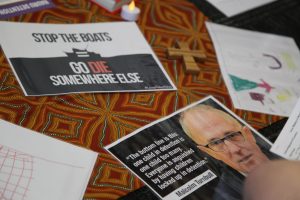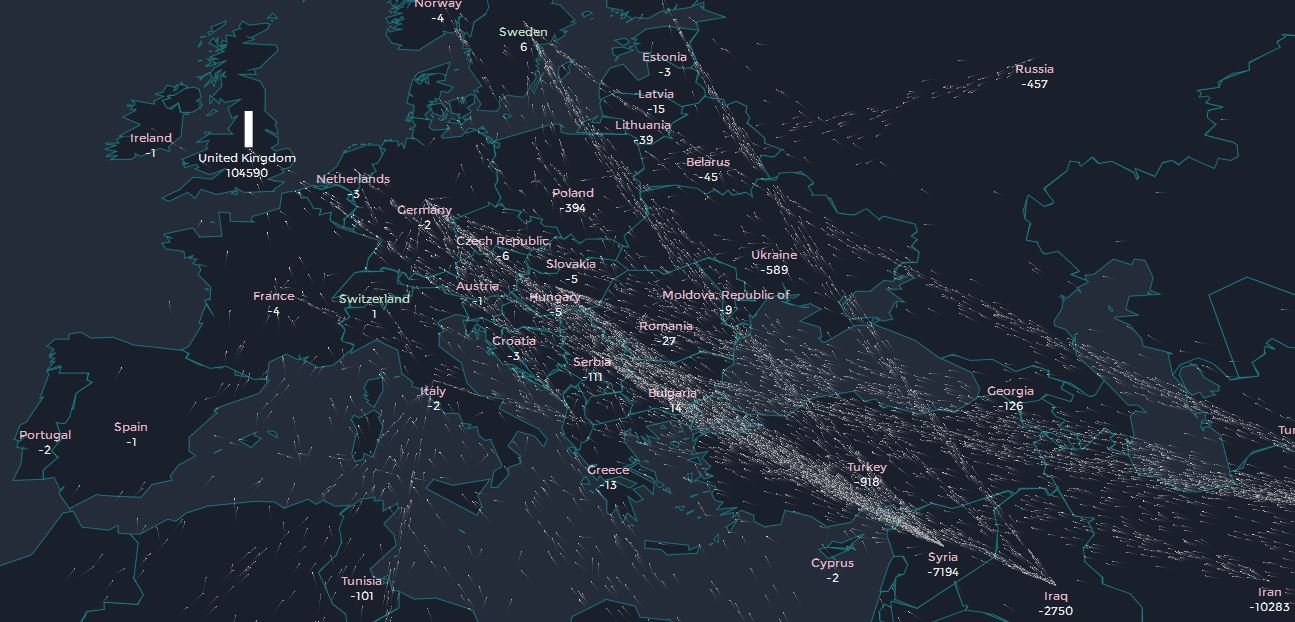developmenteducation.ie recently spoke with an old friend and colleague Phil Glendenning, director of the Edmund Rice Centre for Justice and Community Education in Sydney and now president of the Refugee Council of Australia, about Australia’s offshore and onshore asylum seeker detention system. In his interview with Colm Regan, Phil made five key criticisms of that policy – a policy that is frequently cited in Europe as a model to copy.
1. The current policy ignores the principles and substance of Australian and International law, the rule of law itself and basic respect for human dignity
Australia was one of the first signatories to the 1951 Refugee Convention and has ratified that Convention into domestic law. This means that Australia’s current policy for treating refugee and asylum seekers is actually illegal. Since 2013, Australia’s has implemented a policy for the ‘offshore processing’ of the status of people who arrived by boat on the islands of Manus (in Papua New Guinea) and Nauru. Six years on, in May 2019, there are 531 people in Papua New Guinea (PNG) and 350 on Nauru.
Normally, in Australia the most serious of crimes attract the most serious of sanctions – the withdrawal of liberty and freedom of movement. For the past six years, these people, who have committed no offence under Australian or international law, have endured a process of illegal detention that has deprived them of their liberty and which leaves them in a state of limbo.
2. At a very fundamental level, the process itself is not fair
The current situation is unfair because it automatically excludes boat arrivals from access to support and services normally afforded to people seeking asylum. It excludes government funded legal advice and it excludes a fair and independent review of asylum claims (as outlined in the 1951 Convention). Moreover, it also excludes permanent protection for those recognised as refugees.
Those who have been unfairly refused protection should have their claims reassessed and Australia should repeal the laws that allow the government to return people to persecution. For example, Australia has returned people to Afghanistan, Syria, Iran, Iraq, Rwanda, Colombia and Sri Lanka who were persecuted upon return and indeed a significant number were killed.
Moreover the system is unfair because it punishes people seeking asylum who arrived by boat by detaining them in prison-like circumstances for years, in direct contravention of the Refugee Convention.
3. Australian policy is inappropriately very narrow in focus
Today, there are 68.5 million displaced persons globally; some 25 million are refugees, and each year less than 1% achieve a resettlement outcome. Australia’s current policy has a very narrow focus on the ‘resettlement’ option alone and not on the other 2 ‘durable’ solutions identified by the United Nations High Commissioner for Refugees (UNHCR). These are ‘return to country of origin when safe’ and ‘integration into countries and communities close to areas of conflict’.
In focusing on just one ‘solution’, Australia’s narrow focus falls far short of the standard that a country of its size and capacity in world terms could and should do.
4. It takes asylum seekers and refugees and makes hostages of them

Philosopher Emmanuel Kant once wrote that human beings are an end in themselves not a means to an end. The Australian government argues that the detaining people on Manus Island and on Nauru sends a clear message to people smugglers that this is what will happen to anyone sent by boat. In effect, the policy turns asylum seekers and refugees into hostages.
In recent times the Government has used its military to turn boats around and there have been no successful boat arrivals in Australia for 5 years. This means that Australia’s system of mandatory detention continues to detain people without valid justification in defiance of international law. No other liberal democracy has such a system.
5. It is a cruel and demeaning process
On June 18th, 2019, the Australian Human Rights Commission reported that the Government’s detention system is becoming more and more like prison and unlike similar operations in any other liberal democracy’. Under Australia’s current policy of immigration detention, people are held for an average of 500 days (far longer than in any comparable jurisdiction) in offshore and onshore treatment which can only be defined as cruel and inhumane.
This treatment has resulted in more than 70 attempted suicides in Manus since the 2017 Australian election and 12 suicides and murders in immigration centres since 2013.
This is not how a civilised nation should behave towards some of the world’s most vulnerable people.
Further information
- For more on Australia’s detention policy and its human consequences see the Refugee Council of Australia website (in particular, check out the reports section and the I Choose Humane campaign)
- For a detailed analysis of the data, history, issues and law dimensions of the issue, see the Kaldor Centre for International Refugee Law (University of New South Wales) (see the resources available in the publications section)
- For detail on the impact and context of Australia’s deportations, see the Deported to Danger section of the Edmund Rice Centre (see, in particular, the Well Founded Fear documentary)
Featured photo: screengrab from visualisation of the flow towards Europe, by Lucify, 2016.

